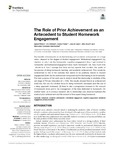The Role of Prior Achievement as an Antecedent to Student Homework Engagement

Use este enlace para citar
http://hdl.handle.net/2183/35104Coleccións
- Investigación (FEDU) [938]
Metadatos
Mostrar o rexistro completo do ítemTítulo
The Role of Prior Achievement as an Antecedent to Student Homework EngagementAutor(es)
Data
2019-02-01Cita bibliográfica
Piñeiro I, Estévez I, Freire C, de Caso A, Souto A and González-Sanmamed M (2019) The Role of Prior Achievement as an Antecedent to Student Homework Engagement. Front. Psychol. 10:140. doi: 10.3389/fpsyg.2019.00140
Resumo
[Abstract] The benefits of homework on student learning and academic achievement, to a large
extent, depend on the degree of student engagement. Motivational engagement (my
intention or why I do the homework), cognitive engagement (how I get involved in
homework), and behavioral engagement (how much homework I do, how much time
I devote to it, how I manage that time) are key aspects that condition the quality of
the process of doing homework, learning, and academic achievement. Prior academic
achievement is one of the variables that seems to be positively related to student
engagement (both due its motivational component and to the training to do homework).
The main purpose of this work was to study in detail this relationship in students of the
last stage of Primary Education (N = 516). The results showed that (i) as achievement
levels rise, the use of a shallow focus to doing homework decreases (and the use of
a deep approach increases); (ii) there is also a progressive increase in the amount
of homework done and in the management of the time dedicated to homework. On
another hand, as in previous research, (iii) no relationship was observed between the
levels of prior achievement and the amount of time spent doing homework.
Palabras chave
Homework
Academic achievement
Motivational engagement
Cognitive engagement
Behavioral engagement
Primary education
Academic achievement
Motivational engagement
Cognitive engagement
Behavioral engagement
Primary education
Versión do editor
Dereitos
Open Access
ISSN
1664-1078





